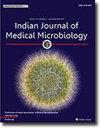新生儿重症监护病房爆发大肠沙雷氏菌病例与洗手池污染有关。
IF 1.4
4区 医学
Q4 IMMUNOLOGY
引用次数: 0
摘要
目的:本文描述了新生儿重症监护室(NICU)中马氏酵母菌爆发的源头:为了确定疫情的来源,我们进行了一项回顾性病例对照研究,其中包括新生儿重症监护室中 12 例马氏菌阳性新生儿和 22 例马氏菌阴性新生儿。在疫情爆发期间收集了分离出的 S. marcescens,并使用全基因组测序(WGS)进行了分析。使用 IQ-Tree 软件、BEAST2 软件包和 SCOTTI 软件构建了系统发生树和传播路径图:指数病例发生于 2021 年 2 月 21 日,疫情于 3 月 9 日结束,共有 12 名新生儿受到影响(2 名感染了 S.marcescens,10 名定植了 S.marcescens)。多变量逻辑回归确定了结论的距离:受污染的洗手池可能是新生儿重症监护室中新生儿感染 S. marcescens 和 S. marcescens 定植的传播中介。距离本文章由计算机程序翻译,如有差异,请以英文原文为准。
Serratia marcescens outbreak in a neonatal intensive care unit associated with contaminated handwashing sinks
Purpose
This article describes the origin of a S. marcescens outbreak in a neonatal intensive care unit (NICU).
Materials and methods
A retrospective case-control study including 12 S. marcescens-positive and 22 S. marcescens-negative neonates in the NICU was performed to identify the source of the outbreak. S. marcescens isolates were collected during the outbreak and analyzed using whole-genome sequencing (WGS). IQ-Tree software, BEAST2 software package and SCOTTI software were used to construct a phylogenetic tree and a propagation path map.
Results
The index case occurred on February 21st and outbreak ended on March 9th, 2021, affecting a total of 12 neonates (2 with S. marcescens infection and 10 with S. marcescens colonization). Multivariate logistic regression identified that the distance of <0.8 m between the bed unit and the sink (odds ratio [OR], 20.50; 95 % confidence interval [CI], 1.09–384.86), a large number of rotating nurses within a week (OR 2.58, 95 % CI, 1.09–6.11) and use of humidification water in the incubator (OR 189.70, 95 % CI, 2.76–13027.31) were significant increased risk factors for S. marcescens infection or colonization in the outbreak. WGS sifted out a predominant clone between contaminated handwashing sinks and patients, suggesting that cross-transmission was involved in the dissemination of S. marcescens.
Conclusion
Contaminated handwashing sinks can be a communication intermediary of S. marcescens infection or colonization of neonates in the NICU. A distance of <0.8 m between the bed unit and the sink, and a large number of rotating nurses might play important roles in this outbreak. Attention should be paid to sinks contamination and contact transmission to prevent outbreaks.
求助全文
通过发布文献求助,成功后即可免费获取论文全文。
去求助
来源期刊

Indian Journal of Medical Microbiology
IMMUNOLOGY-
CiteScore
2.20
自引率
0.00%
发文量
154
审稿时长
73 days
期刊介绍:
Manuscripts of high standard in the form of original research, multicentric studies, meta analysis, are accepted. Current reports can be submitted as brief communications. Case reports must include review of current literature, clinical details, outcome and follow up. Letters to the editor must be a comment on or pertain to a manuscript already published in the IJMM or in relation to preliminary communication of a larger study.
Review articles, Special Articles or Guest Editorials are accepted on invitation.
 求助内容:
求助内容: 应助结果提醒方式:
应助结果提醒方式:


